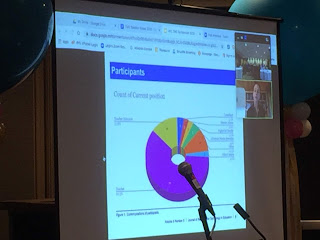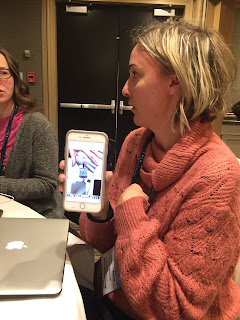— Susan Ewing 🦉 (@Owlfindit) February 1, 2020Still, it's worth me sharing my $0.02.
Saturday, February 1, 2020 - 7:45 a.m.
Another early morning (but my first night's sleep in the hotel where I didn't wake up during the night) and breakfast with the participants of TMC6. I couldn't resist doing some final "red-vest" duties with Emily Burns, directing people to OLBA Bootcamp and answering questions. I will miss working with you Emily!
Saturday, February 1, 2020 - 8:30 a.m.
The TMC spotlight speaker was Garfield and Laura Gini-Newman. Their paper was a real brain-buster for me. I read their paper, "Powerful Instruction and Powerful Assessment: The Double Helix of Learning" before the symposium and this was part of my response:
As someone who was fed and consumed heartily from the Wiggins & McTighe backwards design model, this new way of planning, thinking and assessing is going to take some unlearning and relearning for me. I've got to ask myself some tough questions, like "does this assessment inspire learning?". I think I will need my PLN to help me digest this even more and see what it actually means in practice for me.
I like Jordan's paraphrase about how the Gini-Newmans are encouraging us to rethink assessment:
Central to this paper is the distinction between assessment, "to sit alongside a learner," and evaluation, "to judge a learner." The thinking is about how we move from sitting in judgement to sitting alongside, and how feedback can become guidance.
Saturday, February 1, 2020 - 9:30 a.m.
Anita Brooks-Kirkland spoke about The Eric Walters School Library Summer Lending Challenge research paper that she and Carol Koechlin wrote. For those of you who have not yet read the paper, it's lengthy but extremely thorough. I really need to think about their suggestions. One was to reduce the amount of extra hoops or bureaucratic steps needed to make it happen. I was one of those schools that arranged a special note, translated into Chinese and English, to explain and gain permission. Am I at the stage where I can get rid of that yet? I'm not sure.
Saturday, February 1, 2020 - 10:30 a.m.
Time for table talks! Seven of us that had contributed papers to Treasure Mountain Canada 6 gave a one minute promotional blurb to encourage participants to come to our tables to discuss the papers.
The photo below includes Rebeca Ruibo, Alanna King, Beth Lyons, and me, Diana Maliszewski (#5).
 |
| Presenter line up |
I didn't take pictures during my table talk, but I did take notes. I wanted to treat my session as a discussion forum where I could learn from the participants just as much as they might learn from me.
 |
| Promo slide for my talk |
In the first round, I had Pam, Alison, Sarah, Jonelle, and Lisa at my table and I want to thank them for their contributions. I like how Pam admitted that she wasn't a "manga person" and that led her school's manga club to make purchasing recommendations that she often followed (with series research by her). I like how Jonelle used an online wish list and included benefits like being the first to borrow the book if you suggested that the school library buy it. I also like Jonelle's future plans to include the leadership class in making some more purchasing decisions for the school library. I appreciated Lisa's work with her school in teaching students with an equity lens so they can develop the criteria for examining the school library collection. I also admire how Alison said she want to make how she chooses books for the school library collection more visible and transparent.
In the second round, I had Leigh, Erin, Toni, Jess, Dawn, Christie and Jane, and once again, I want to thank them for their contributions to our discussion. They had such good, important points to make. When circumstances prevent you from actually taking students to buy books at book stores or with approved board vendors, there are other options you can employ. Christie uses a mailbox of requests (and it's fascinating to see that half of the suggestions are titles already in her school library's collection). Jess uses wish lists and asks students to put in their requests. Leigh wondered about the possibility of using the Scholastic flyers as ways for students to give input. After considering how selecting from lists or recommendations would be similar or different from in-person shopping (while being mindful of the equity issues that are part of those actions), the group also talked about the kinds of evidence or proof that could be collected to show that involving students makes a different. Suggestions included circulation statistics, surveying parents to see if they noticed any behaviour or comments from their children after the experience, asking teachers to identify students disengaged with reading and invite the class teachers to observe and record any changes in those students after such a trip, and meta-cognitive data.
I'm sorry I didn't get a chance to hear the other morning table talks. They sounded good!
Reflecting on our journey with the #LarkspurGeniusCart at #TMCanada2020 . Lots of talk about #makerculture #inquirymindset and guiding students through the process of making. Check out the photo essay that accompanies my paper here- https://t.co/jWbUq46WHO @LarkspurPS— MrsLyonsLibrary (@mrslyonslibrary) February 1, 2020
So proud of @TDSB TLs @mzmollyTL @Rabia_Khokhar1 & @MmeLisa_Lewis Sharing their innovative & thoughtful instructional practice at the Canadian School Library research symposium. Read the papers https://t.co/9kV3nR3n6N @tdsb_IRCLibrary @LC3_TDSB @LC4_TDSB #Saturday pic.twitter.com/V1vaniIcCr— TDSB Library Learning Resources (@TDSBLibrary) February 1, 2020
I want to publicly thank @LongthorneJess for offering an important perspective (not negative as she suggested) and highlighting urban/rural inequities during a table talk - you are the best Jess! #TMCanada2020— Diana Maliszewski (@MzMollyTL) February 1, 2020
Once again, big thanks to Jordan Graham for capturing the essence of two of the other morning table talks - you can read them here: https://tmcanada.blogspot.com/2020/02/table-talk-snapshots-round-1.htmlI wish I had known....my retrospective slides from our #tmcanada2020 table talks. Shoutout to @rubenrp @henryjenkins @ninaksimon for their work in the unofficial guidance of my journey. The full paper is available @CdnSchoolLibrar https://t.co/dM2wB0s7pU— ᗩᒪᗩᑎᑎᗩ KIᑎG 🍌📚 (@banana29) February 1, 2020
Saturday, February 1, 2020 - 11:30 a.m.
 |
| Leigh online |
"Learning about, with, and from people of varying cultural practices requires educators to help students reject ethnocentrism while better understanding their own cultural practices of which they may lack consciousness."
Jordan Graham summarized Leigh's talk here - https://tmcanada.blogspot.com/2020/02/spotlight-speaker-leigh-cassell.html and Carol had us do a building connections activity just before lunch.
 |
| Reaching 3 types of educators (I forgive whoever took my cell) |
Ask and you will receive - thank you @LeighCassell for sharing resources on scholars influencing cultural responsive pedagogy #tmcanada2020 pic.twitter.com/DJr5hh6Jjy— Diana Maliszewski (@MzMollyTL) February 1, 2020
Saturday, February 1, 2020 - 1:15 p.m.
Our afternoon, whole-group spotlight speaker was Deborah Dundas, from The Toronto Star. She shared her work doing her version of the Cooperative Children's Book Center, School of Education, University of Wisconsin-Madison's investigation into Diversity in Children's Books. Deborah was very patient with our flurry of questions and I'm so glad to hear that she'll be doing a follow-up survey.
 |
| Deborah speaks |
Diversity in Children's Books Graphic Distribution #TMCanada2020 https://t.co/7ld5vFFZdl— Melanie Mulcaster (@the_mulc) February 1, 2020
Examining Canadian children’s publishing for racial diversity. Not “as bad” as expected, but always could be better.— Niki Card (@NikiCard) February 1, 2020
Fascinating questions and discussion coming out of @debdundas’s data. #TMCanada pic.twitter.com/CKAysqzAjQ
Saturday, February 1, 2020 - 1:45 p.m.
More table talks! This time I was lucky enough to listen instead of speak. Jordan attended two sessions that I did not. You can read her impressions at https://tmcanada.blogspot.com/2020/02/table-talk-snapshots-round-2.html
 |
| Getting shadows to work with you |
Jane's session also involved taking as many different angles of a small object as possible. Here are all of the shots I took.in a BeFunky photo collage.
@MsDennisMoore asked how many angles/ways/perspectives I could take of an object. I didn’t see myself as a photographer before today. Thanks for making me rethink my abilities & giving me a new way to engage our Ss @ConestogaPS. #newTFF #TMCanada2020 pic.twitter.com/gFFDm4r2mT— Mrs. Booker (@CABooker22) February 1, 2020
The second session during this round that I attended was by Jonelle St. Aubyn, called "The Human Library at the Luise Arbour Secondary School Library Learning Commons". I've wanted to replicate this at my school for years and Jonelle explained how she did it, both at her table talk and in her paper. She said that some of her students are quite sheltered (i.e. they are not allowed to take public transit on their own) so this event was helpful to change their perspectives. It's tricky to contact individuals who might make great "human books" because the philosophy is that no one gets paid for this encounter. Thankfully, Jonelle had a lot of contacts. The most popular "human book" was their school's NPU officer - questions asked included things like "What do I do if I get pulled over by the police?" Some groups were more interested in hearing the person's story than asking them questions, like the heart transplant recipient. It was important to have representation and role models. Jonelle recommended listing multiple parts of identities (e.g. LGBQT + testicular cancer survivor / South Asian + artist). She emphasized that this event is not meant to be a career fair. Her advice is to start planning early because visitors need to have a criminal background check.
It was an honour and a pleasure to present the Human Library at LASS at #TMCanada2020. It's incredible to learn with so many inspiring teacher librarians on a Saturday afternoon. @CdnSchoolLibrar @LASSinspires— Jonelle St. Aubyn (@Ms_St_Aubyn) February 1, 2020
Saturday, February 1, 2020 - 2:55 p.m.
The "Big Think" is a David Loertscher speciality - getting participants to synthesize, prepare next steps, and think beyond. Why not involve other specialist teachers in co-planning, co-teaching, and co-assessing? What if the music teacher worked in conjunction with a classroom teacher? Or a phys-ed specialist? What might be possible if it was a School Learning Commons and not just a School Library Learning Commons? Each group brainstormed areas inspired by various papers presented during the symposium. (Jordan writes about this session here - https://tmcanada.blogspot.com/2020/02/the-big-think-david-loertscher_1.html)
We ended the day with a surprise present for the "godmothers of Canadian school libraries" and Canadian School Libraries Chair and Vice-Chair, Anita Brooks-Kirkland and Carol Koechlin.
Lots of great connections were made, both near ... (as in TDSB, my own school board)
and far ... (as in other provinces, like my friends in Manitoba and our Nova Scotia connections)
Let the learning live on!Terri, we were so happy to have you there. Let us know what we can do in Ontario @oslacouncil to help/support you! #OLASC #TMCanada2020 https://t.co/Ug1vJj6aWw— Diana Maliszewski (@MzMollyTL) February 2, 2020










Thanks so much for the shoutout and for sharing your experiences and thoughts, Diana! It's so valuable to have a reflective "$0.02"!
ReplyDeleteThanks for all of your reflections on SC and TMC6, Diana. You are tireless! As for your reflection on summer lending - I would not count making the summer lending info accessible in different languages as a procedure that limits access. Quite the contrary! You opened doors for people. We did hear of some schools in the study who are considering eliminating procedures like not allowing primary students to participate, or limiting them to a small number of books. Some schools were also looking at their final due date procedures and whether they inhibited summer access.
ReplyDeleteThanks so much for this. My head had officially reached capacity by lunchtime, so I headed home early. I really appreciate your synopses of the sessions I missed. I was astounded at the hard work, research and deep thinking that went into all of the papers!
ReplyDelete